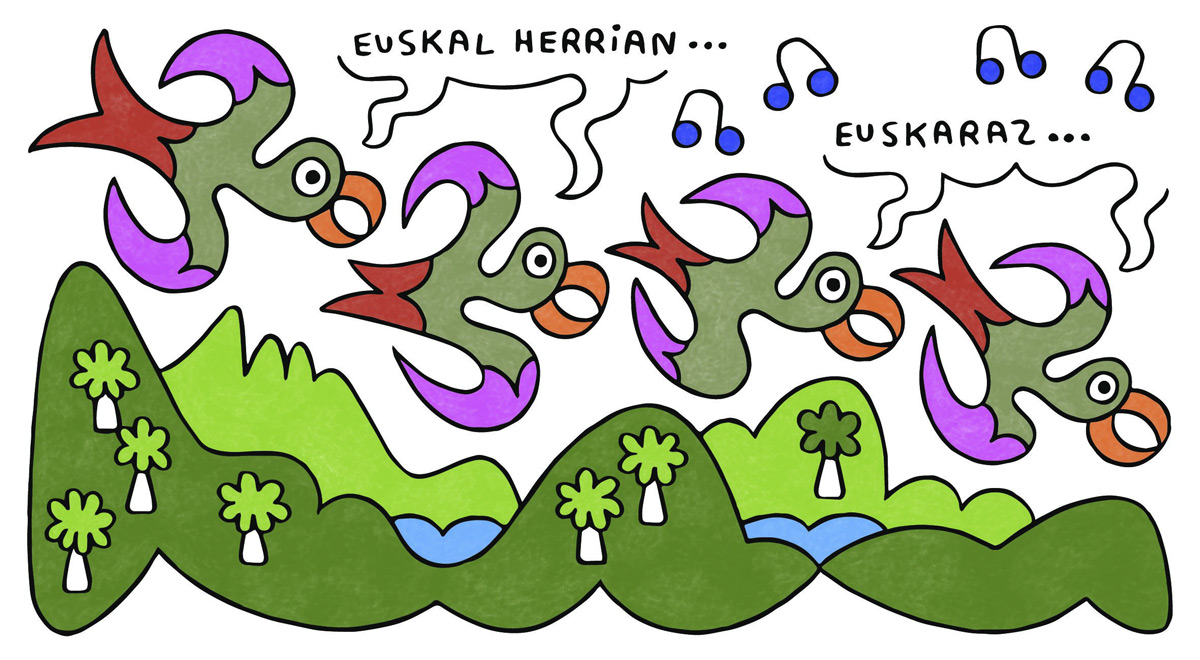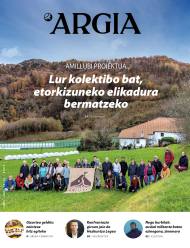Should we not give Basque to adult immigrants?

UEMA, the Commonwealth of Basque Municipalities, presented to the media last month a campaign under the motto Egin nirekin euskaraz. Families have emerged that do not originate in the Basque Country, along with representatives of UEMA. They say that we Euskaldunes often approach these children in Spanish and it hurts them, because many know Euskera. The president of UEMA appeared alongside the school teachers of the two Basque peoples.
I believe that the campaign is very appropriate and necessary, because I have often realized that these behaviors are very alive among the Basques, both in the Basque people and, moreover, in the most Castilian speakers, who are denied the possibility of expressing themselves in Basque. But the campaign seemed even more interesting to me, because it's not just about relationships with children, it's about adults to go, and in our relationships with adults, it's about Spanish. Children, despite the problems (and the difficulties that schools have and the lack of resources to use them) learn in Basque, especially in the Basque villages, and it is a pleasure to hear the lid of the cap in Basque. Another thing is what happens to adults.
Immigrants who have come to the Basque Country at an early or adult age and have learned Basque are minimal. In the article entitled “The Dreamy Path of Migrants to Learn Euskera”, the media “The Dreamy Path to Learn Euskera” has provided some data from a survey conducted by the Begirune Foundation in 2023. Among them, 84% of the immigrants surveyed say they do not know anything or anything in Basque, 10% say they know only the basic level and 5% say they know Basque well or quite well. The majority opinion is that you do not need Euskera to live in the Basque Country, 65% say that you never use Euskera in their surroundings.
The majority opinion is that you do not need Basque to live in the Basque Country, 65% say you never use Basque in their environment.
These people have come to work for vital needs and work in our homes, bars, hospitals and other workplaces. The Hordago Jump has received testimonies from four of these people and four say they have been given very few opportunities to learn Basque. And they say that, in addition to economic aid, which is not yet guaranteed, the working day should be reduced and Euskera's learning made possible during those hours.
At this juncture in which a more ambitious language policy and a new socio-political agreement are proposed, one of the measures to be implemented must be urgent, to give priority and facilities so that the immigrants who come to us constantly are not Castilian, but Euskera, including the reduction of working hours and the possibility of learning Euskera within working hours.
Employers, whether they are private individuals (in our homes we have mainly caregivers who do not know Euskera with older people who have always spoken in Euskera) or whether they are private administrations or companies, we have to put in means and money for hired workers to learn Euskera.
Responsibility has to be shared: the Basques have to learn how to keep the Basque, OK, and we have work, but the contribution of resources to learn the Basque with dignity corresponds to the employers and the administration. The third leg consists of the migrants themselves. I would be grateful if you would ask the Basques more often not to change their language in front of them, because they would help us a great deal.
Bidali zure iritzi artikuluak iritzia@argia.eus helbide elektronikora
ARGIAk ez du zertan bat etorri artikuluen edukiarekin. Idatzien gehienezko luzera 4.500 karakterekoa da (espazioak barne). Idazkera aldetik gutxieneko zuzentasun bat beharrezkoa da: batetik, ARGIAk ezin du hartu zuzenketa sakona egiteko lanik; bestetik, egitekotan edukia nahi gabe aldatzeko arriskua dago. ARGIAk azaleko zuzenketak edo moldaketak egingo dizkie artikuluei, behar izanez gero.
I received your e-mail in personal mail on the strike portals. At first, like many others, I thought it was to let you know what options we have in the face of the strike. But no, the e-mail received was a political and communicative movement against the strike.
I will confess... [+]
This weekend I've been thinking about the word 'aesthetic' in relation to a phrase said by a friend: “This work is aesthetic.” I have studied the etymology of the word aesthetic, it seems that its meaning was originally perceived through the senses, and it was later associated... [+]
In recent years, the concept of industrial policy has reappeared strongly at various levels. The organization that was the hammer of neoliberalism, the International Monetary Fund, today insists that markets have been pressured to allocate resources efficiently and solve these... [+]
The other day in Bilbao, I met a friend at the Bira bar. We were very happy at the Tar and I said: “Of course, since you’re Guipúzcoa, hahahaha.” And he insisted that he was not Guipuzcoan. Without me understanding it, I kept saying, “Ah! Is it not? You were born in New... [+]
Zalantza asko izan ditut, meloia ireki ala ez. Ausartuko naiz, zer demontre! Aspaldian buruan dudan gogoeta jarri nahi dut mahai gainean: ez da justua erditu den emakumearen eta beste gurasoaren baimen-iraupena bera izatea. Hobeto esanda, baimen-denbora bera izanda ere, ez... [+]
We are in the midst of a world imperialist offensive led by the Western bourgeoisie. The form that the imperialist offensive has taken is that of war, with all its variants: economic war, cognitive and cultural war, lawfarr; and, of course, military war. Western imperialism has... [+]
I just saw a series from another sad detective. All the plots take place on a remote island in Scotland. You know how these fictions work: many dead, ordinary people but not so many, and the dark green landscape. This time it reminded me of a trip I made to the Scottish... [+]
To be honest, I don't know why I'm writing this. In today’s hostile environment, opinions of this kind are not well received. Perhaps LUZ will not publish this because it does not correspond to the opinions they have published so far (but if they have finally decided to publish... [+]
On January 15, the techno-business lobby called Cedarios presented its 6th report, Euskadi and the European Union, the shared destiny of prosperity and competitiveness. This neoliberal Think Tank, made up of eminent experts drawn from the world of finance, presented a magical... [+]
We Basques move our feet behind the witness of Korrika to proclaim that we want to survive as a Basque people in favor of our language, with the aim of the Basque Country we desire.
The tipi-tapa is the first step taken by a migrant person who leaves his homeland in Africa,... [+]
And for another year, the unions have organized prefabricated strikes for us. And we, individually, will decide whether or not to join the strike, without the need for any assembly at the school.
The strike model that I was taught is no longer in vogue, it seems. In my... [+]
Life surrounds everything, it is limited and fragile. To live good lives, it seems to me that the body knows what to do, while the mind, although it knows (when it is well informed), often sees the body deliberately silence. In this silence the mind opens itself to relations... [+]
Eroso gaude ingurunea gure egoera fisiko/emozionalera egokitzen denean. Besteak ni kontuan hartu nauenean, izan gizaki bat, objektu bat, espazio bat. Erosotasunaren klabea produktu eta espazio diseinuan beharrizan handi gisa sartu da, erosotzat jotzen dena erosgarria delako... [+]




















